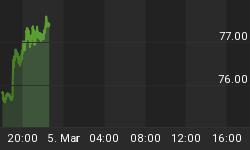Reader Toney writes ...
Hello Mish,
Please consider writing a piece on your blog explaining why EUR USD is not more eroded. It would seem that given the Euro zone's current troubles, the Euro would not have remained as strong as it has.
I read your blog religiously.
Thanks
Toney
Hello Toney, would not exactly call 1.23 "strong" but certainly there is room to fall. So why is it just sitting?
Technically, the euro is at the lower end of a trading range and that would tend to bring out some buyers and some short covering. From that aspect, one might even wonder why the bounce has been anemic. A weekly chart will show what I mean.
Euro Weekly

Technically, the euro can plunge a long way if that weekly support gives way. Will it?
Key Questions on Breaking Up
Right now the currency market is torn between whether or not the eurozone stays intact, and if not, what countries leave and how.
A eurozone breakup is easily the primary driver. How the break-up occurs is unresolved.
The Eurozone Cannot Possibly Survive Intact. As I have pointed out, The Problem in Europe is Arithmetic, Not Confidence.
Will a break-up be orderly or disorderly? Will Germany leave or will Spain and Greece leave? Those are the key questions and right now I do not have an answer (and no does anyone else either).
If Germany leaves, Deutschemark will soar and the euro will plunge. Moreover, if Spain and Italy leave in a disorderly fashion there might easily be a currency crisis of some sort, also forcing the euro lower.
However, if Spain and Italy leave in an orderly fashion, the euro could strengthen.
Right now, the market seems to be prepared for the "Grexit" and it does appear that Greece will leave in a somewhat- orderly fashion. Should Greece leave without causing a mess, the markets are likely to take that as a positive for the euro over the short-to-intermediate-term.
I am roughly neutral on the euro for the short-term.
A secondary factor is ECB printing and here the results are counter-intuitive. Every time the ECB comes up with a major program such as the LTRO, the euro has strengthened.
That suggets the market favors keeping everything intact, even though it adds long-term pressures. For example, the LTRO made it easy for German and French to unload Spanish debt (a good thing for banks in those countries). However, the buyers of that debt were Spanish banks who ultimately will be left holding the bag.
Short-term the LTRO was stabilizing, long-term it is going to increase the pressure on Spain to leave.
Notice how screwed up things are. The normal fundamental factors in play regarding currencies are interest rate differentials, balance-of-trade flows, and concern over budget deficits. The US would not score well on those points, but clearly these are far from normal times.
The euro now depends on when, in what order, and how disorderly a break-up will be.
Read more at http://globaleconomicanalysis.blogspot.ca/2012/08/reader-question-why-is-euro-so-strong.html#AjIAzCUi1BEkSSSD.99















